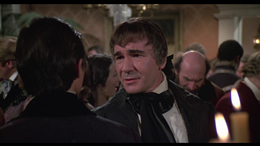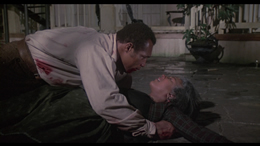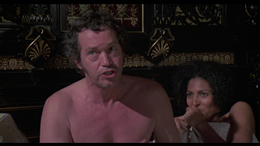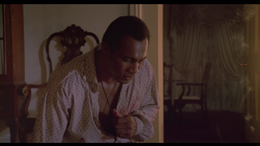

Color, 1976, 110m.
Directed by Steve Carver
Starring Warren Oates, Ken Norton, Isela Vega, Yaphet Kotto, Pam Grier, John Colicos, Fiona Lewis, Paula Kelly, Rainbeaux Smith, Royal Dano
Kino Lorber (Blu-ray & DVD) (US RA/R1 HD/NTSC) / WS (1.85:1) (16:9)

As unlikely as it may seem today, Paramount scored a significant hit in 1975 with the racially-charged Mandingo, a pulpy, bloody  soaper set on a Southern plantation. Based on the popular but disreputable series of Falconhurst novels by Kyle Onstott. Not surprisingly, a sequel was quickly rushed into production by United Artists, adapted from the second novel in the series, Drum. However, the path for that one didn't go very smoothly as initial director Burt Kennedy was sacked after a few days' shooting; his work comprises the now abbreviated opening to the film.
soaper set on a Southern plantation. Based on the popular but disreputable series of Falconhurst novels by Kyle Onstott. Not surprisingly, a sequel was quickly rushed into production by United Artists, adapted from the second novel in the series, Drum. However, the path for that one didn't go very smoothly as initial director Burt Kennedy was sacked after a few days' shooting; his work comprises the now abbreviated opening to the film.
Ken Norton, who played Mede in the first film, was brought back to play the title character, a pit fighter near the Falconhurst estate who's forced into fights with fellow slaves including the more rebellious Blaise (Kotto). Through a tortuous series of events both men wind up sold to Hammond Maxwell (Oates), the Falconhurst heir previously played by Perry King. While the wealthy white landowners idle their days away with sexual debauchery and violent mistreatment of their slaves, Drum becomes more incensed by his surroundings -- which include three particularly perverse women, the aristocratic Augusta (Lewis), the insatiable Marianna (Vega), and spoiled, snotty rich girl Sophie (late cult favorite Smith, who made this back to back with Massacre at Central High and Revenge of the Cheerleaders). As you can probably guess from the poster art, it all climaxes in a fiery showdown that leaves more than a few bodies strewn across the plantation steps.
 Shamelessly trashy and highly enjoyable if you're in the right mood, Drum barely even pretends to pose as a social issues film. Instead it's mainly a showcase for actors to chew scenery left and right, with the always dynamic Oates at the center and Battlestar Galactica's John Colicos popping up now and then in a jaw-dropping turn as a lascivious gay French slave trader. Director Steve Carver was brought in to helm the film after his solid work on Big Bad Mama and Capone, both of which demonstrated his ability to deliver enough nudity and violence to keep audiences entertained, and the film gets a very glossy veneer from numerous pros behind the camera like costume designer Ann Roth and cinematographer Lucien Ballard. Carver
Shamelessly trashy and highly enjoyable if you're in the right mood, Drum barely even pretends to pose as a social issues film. Instead it's mainly a showcase for actors to chew scenery left and right, with the always dynamic Oates at the center and Battlestar Galactica's John Colicos popping up now and then in a jaw-dropping turn as a lascivious gay French slave trader. Director Steve Carver was brought in to helm the film after his solid work on Big Bad Mama and Capone, both of which demonstrated his ability to deliver enough nudity and violence to keep audiences entertained, and the film gets a very glossy veneer from numerous pros behind the camera like costume designer Ann Roth and cinematographer Lucien Ballard. Carver  follows the Roger Corman edict of delivering bare breasts and/or a fight scene every ten minutes, and the end result is a sordid, messy, but oddly endearing film that could never be made today. If you're interested in the film, be sure to also check out Paul Talbot's excellent book, Mondo Mandingo, which takes a head-spinning tour through both films and all of the books.
follows the Roger Corman edict of delivering bare breasts and/or a fight scene every ten minutes, and the end result is a sordid, messy, but oddly endearing film that could never be made today. If you're interested in the film, be sure to also check out Paul Talbot's excellent book, Mondo Mandingo, which takes a head-spinning tour through both films and all of the books.
While Mandingo had the benefit of a major studio behind it well into the VHS era, Drum was handed off to Vestron and became surprisingly difficult to find for many years. MGM showed very little interest in the film after absorbing the United Artists library, keeping it off of DVD but eventually allowing it to pop up for a couple of surprise airings in the early days of MGM HD. Thankfully the opening of the studio's catalog floodgates to other labels has resulted in a lot of maligned titles like this turning up in surprising special editions on Blu-ray, and this one is no exception with Kino Lorber stepping up to the plate. The old Vestron transfer was an incredibly dark, murky, colorless mess (with an even shoddier UK DVD popping up briefly a decade ago), but this is a significant improvement with satisfying color and details throughout.  There's more damage than usual for an MGM transfer with some debris flitting across the screen now and then, but it's such a tremendous upgrade most probably won't care. The DTS-HD mono audio sounds very good throughout.
There's more damage than usual for an MGM transfer with some debris flitting across the screen now and then, but it's such a tremendous upgrade most probably won't care. The DTS-HD mono audio sounds very good throughout.
Extras include the hyped-up theatrical trailer and a new audio commentary with Carver and Code Red's Bill Olsen, which covers the tremendous amount of ground from the film's original director to the rocky path it took through the MPAA to get an R rating (with a great deal of sex and nudity scissored in the process, though an insane amount still remains in the finished product). Carver explains how he got the gig through Corman and dealt with a tricky situation as the production started, with many actors departing in solidarity with Kennedy. (His stories about Vega are great, too.) It's a shame all the excised material from Carver's original cut appears to be lost as some of the scenes sound quite valuable, including far more involving the great Pam Grier (who has very little to do in the finished product). It's great to have the director's experience preserved here as it provides some much-needed history for a film that can still baffle, amuse, and shock unprepared viewers.
Reviewed on December 25, 2014.







